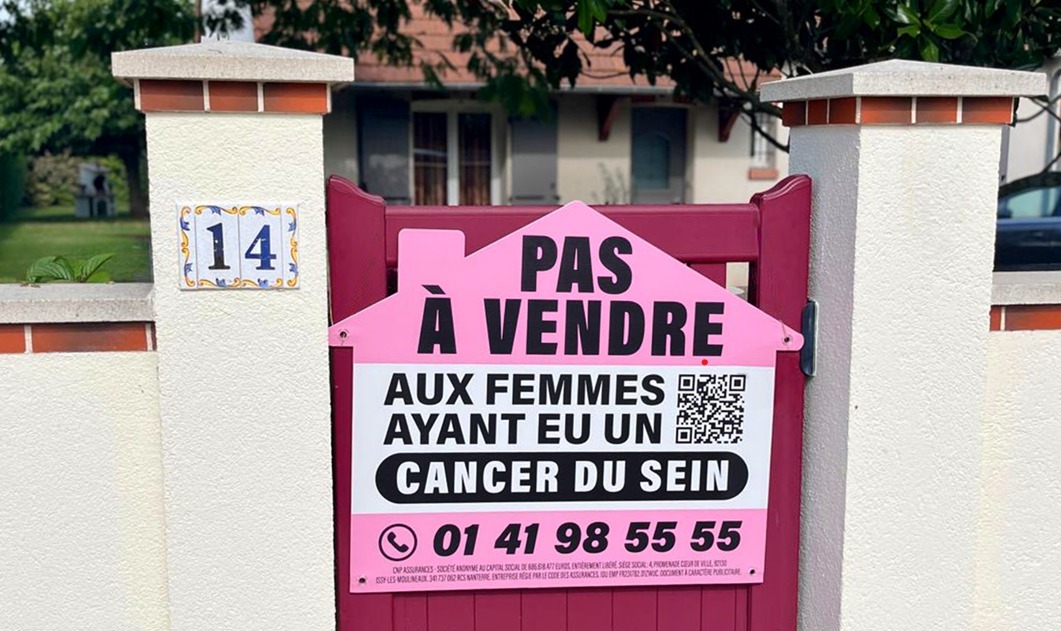Published on
updated on
Reading 3 min.
Through a shock campaign, CNP Assurances wants to raise awareness among the general public of the right to be forgotten, for patients cured of cancer. The organization particularly targets women affected by breast cancer, recalling that they can have access to “loan insurance without additional premiums or reductions in guarantees linked to their cancer, and this, from the end of their therapeutic protocol”.
“Not for sale to women who have had breast cancer“. As Pink October approaches, CNP Assurances is unveiling a shock campaign with this message, to remind people of the right to be forgotten for women affected by the disease (as for all people affected by cancer).
A campaign incorporating the codes of the real estate sector
This campaign is illustrated by images of house facades, plastered with a for sale sign, as real estate agencies do. But also through an internet page for searching for apartments or houses. The detail lies in the message displayed on the advertisements: “Not for sale to women who have had breast cancer“.

The image shocks and reminds us of the importance of the right to be forgotten, which concerns all people who have been affected by cancer, whatever it may be. If the insurance organization chose women affected by breast cancer, it is probably because of their number. “More than 60,000 women are diagnosed with breast cancer each year in France. recalls the press release. “Behind this figure, there are so many destinies turned upside down and life projects postponed.
Before indirectly raising the question of the right to be forgotten. “A little-known problem: women who have had breast cancer and wish to buy real estate encounter difficulties in accessing property: either they have to wait, sometimes several years, before getting started, or the insurance companies refuse all or part of the guarantees, either these women have to pay much more”.
What is the right to be forgotten?
The “right to be forgotten” is a legal concept which allows people who have suffered from serious illnesses, such as cancer, to no longer have to declare their previous illness after a certain period when applying for loans or insurance.
On February 3, 2022, deputies and senators voted in the Joint Committee to adopt the right to be forgotten after 5 years and the elimination of medical selection, via a questionnaire, in the case of certain financial loans. Céline Lis-Raoux, founder of the Rose Up association, fought for a long time to ensure that this right to be forgotten was possible for people cured of cancer, and reduced to five years instead of ten, as was the case. cases until 2022.
“By having this law adopted, a person who was ill in 2013, for example, is considered cured in 2018 and if they wish to take out a loan, they no longer have to mention their cancer in the health questionnaire that will be submitted to them.” Céline Lis-Raoux told us on the subject, in 2022. “As for the health questionnaires themselves, we wanted them removed because of the additional premiums they generate for sick people. It is an injustice for these people who pay very high prices for their insurance, when these same organizations offer very low prices to young and healthy people.
CNP Assurances wants to “raise awareness on the subject”
Through this campaign, CNP Assurances wants to “raise awareness among the general public on the subject” and “informs women who have had breast cancer that they can now obtain loan insurance without additional premiums or reductions in guarantees linked to their cancer, from the end of their therapeutic protocol“.
We therefore contacted Sandrine Mouchet, editor-in-chief of Rose magazine, to find out the point of view of the Rose Up association on the issue. She welcomes the campaign launched, first of all. “Obviously, this campaign will help to shed a little more light on the right to be forgotten which concerns women who have been affected by breast cancer, but also all other patients affected by another type of cancer.
The editor-in-chief of Rose provides a nuance, however. “If the approach is beneficial, it is also an opportunity to remember that many banking or insurance establishments do not respect the law. Moreover, CNP Assurances, in its press release, is not very clear and speaks of obtaining loan insurance for patients ‘as soon as their therapeutic protocol ends’. What does that mean?” she asks.
“If a woman affected by breast cancer pursues hormone therapy for 10 years, does this treatment fit into the therapeutic protocol cited? Which would mean she couldn’t get insurance before that time?” she asks again.
If the right to be forgotten is indeed enshrined in law, patients must still be informed of their rights and insurers of their legal obligations.
